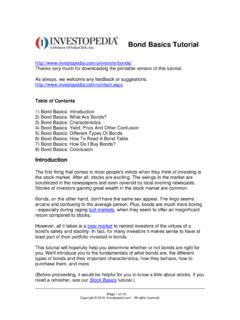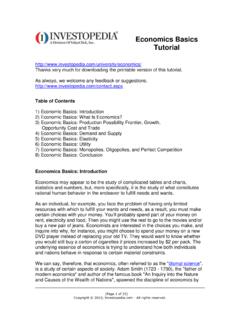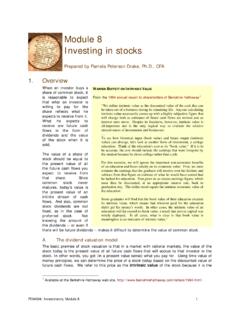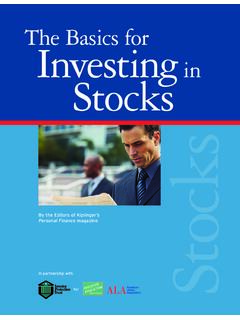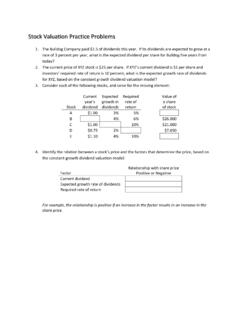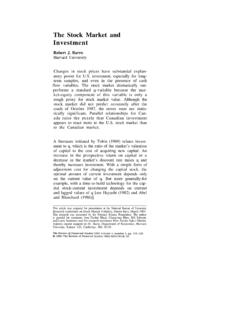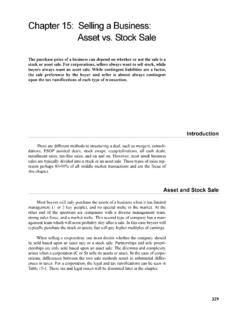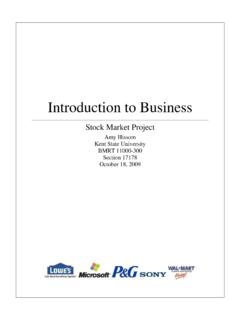Transcription of Stock Basics Tutorial - i.investopedia.com
1 (Page 1 of 14) Copyright 2010, - All rights reserved. Stock Basics Tutorial Thanks very much for downloading the printable version of this Tutorial . As always, we welcome any feedback or suggestions. Table Of Contents 1) stocks Basics : Introduction 2) stocks Basics : What Are stocks ? 3) stocks Basics : Different Types Of stocks 4) stocks Basics : How stocks Trade 5) stocks Basics : What Causes Stock Prices To Change? 6) stocks Basics : Buying stocks 7) stocks Basics : How To Read A Stock Table/Quote 8) stocks Basics : The Bulls, The Bears And The Farm 9) stocks Basics : Conclusion Introduction Wouldn't you love to be a business owner without ever having to show up at work? Imagine if you could sit back, watch your company grow, and collect the dividend checks as the money rolls in! This situation might sound like a pipe dream, but it's closer to reality than you might think. As you've probably guessed, we're talking about owning stocks . This fabulous category of financial instruments is, without a doubt, one of the greatest tools ever invented for building wealth.
2 stocks are a part, if not the cornerstone, of nearly any investment portfolio. When you start on your road to financial freedom, you need to have a solid understanding of stocks and how they trade on the Stock market. Over the last few decades, the average person's interest in the Stock market has grown exponentially. What was once a toy of the rich has now turned into the vehicle of choice for growing wealth. This demand coupled with advances in trading technology has opened up the markets so that nowadays nearly anybody can own stocks . Despite their popularity, however, most people don't fully understand stocks . the resource for investing and personal finance education. This Tutorial can be found at: (Page 2 of 14) Copyright 2006, - All rights reserved. Much is learned from conversations around the water cooler with others who also don't know what they're talking about. Chances are you've already heard people say things like, "Bob's cousin made a killing in XYZ company, and now he's got another hot " or "Watch out with stocks --you can lose your shirt in a matter of days!
3 " So much of this misinformation is based on a get-rich-quick mentality, which was especially prevalent during the amazing dotcom market in the late '90s. People thought that stocks were the magic answer to instant wealth with no risk. The ensuing dotcom crash proved that this is not the case. stocks can (and do) create massive amounts of wealth, but they aren't without risks. The only solution to this is education. The key to protecting yourself in the Stock market is to understand where you are putting your money. It is for this reason that we've created this Tutorial : to provide the foundation you need to make investment decisions yourself. We'll start by explaining what a Stock is and the different types of Stock , and then we'll talk about how they are traded, what causes prices to change, how you buy stocks and much more. What Are stocks ? The Definition of a Stock Plain and simple, Stock is a share in the ownership of a company. Stock represents a claim on the company's assets and earnings.
4 As you acquire more Stock , your ownership stake in the company becomes greater. Whether you say shares, equity, or Stock , it all means the same thing. Being an Owner Holding a company's Stock means that you are one of the many owners (shareholders) of a company and, as such, you have a claim (albeit usually very small) to everything the company owns. Yes, this means that technically you own a tiny sliver of every piece of furniture, every trademark, and every contract of the company. As an owner, you are entitled to your share of the company's earnings as well as any voting rights attached to the Stock . A Stock is represented by a Stock certificate. This is a fancy piece of paper that is proof of your ownership. In today's computer age, you won't actually get to see this document because your brokerage keeps these records electronically, which is also known as holding shares "in street name". This is done to make the shares easier to trade. In the past, when a person wanted to sell his or her shares, that person physically took the certificates down to the brokerage.
5 Now, trading with a click of the mouse or a phone call makes life easier for everybody. Example Stock certificate (Click to enlarge) the resource for investing and personal finance education. This Tutorial can be found at: (Page 3 of 14) Copyright 2006, - All rights reserved. Being a shareholder of a public company does not mean you have a say in the day-to-day running of the business. Instead, one vote per share to elect the board of directors at annual meetings is the extent to which you have a say in the company. For instance, being a Microsoft shareholder doesn't mean you can call up Bill Gates and tell him how you think the company should be run. In the same line of thinking, being a shareholder of Anheuser Busch doesn't mean you can walk into the factory and grab a free case of Bud Light! The management of the company is supposed to increase the value of the firm for shareholders. If this doesn't happen, the shareholders can vote to have the management removed, at least in theory.
6 In reality, individual investors like you and I don't own enough shares to have a material influence on the company. It's really the big boys like large institutional investors and billionaire entrepreneurs who make the decisions. For ordinary shareholders, not being able to manage the company isn't such a big deal. After all, the idea is that you don't want to have to work to make money, right? The importance of being a shareholder is that you are entitled to a portion of the company s profits and have a claim on assets. Profits are sometimes paid out in the form of dividends. The more shares you own, the larger the portion of the profits you get. Your claim on assets is only relevant if a company goes bankrupt. In case of liquidation, you'll receive what's left after all the creditors have been paid. This last point is worth repeating: the importance of Stock ownership is your claim on assets and earnings. Without this, the Stock wouldn't be worth the paper it's printed on.
7 Another extremely important feature of Stock is its limited liability, which means that, as an owner of a Stock , you are not personally liable if the company is not able to pay its debts. Other companies such as partnerships are set up so that if the partnership goes bankrupt the creditors can come after the partners (shareholders) personally and sell off their house, car, furniture, etc. Owning Stock means that, no matter what, the maximum value you can lose is the value of your investment. Even if a company of which you are a shareholder goes bankrupt, you can never lose your personal assets. Debt vs. Equity Why does a company issue Stock ? Why would the founders share the profits with thousands of people when they could keep profits to themselves? The reason is that at some point every company needs to raise money. To do this, companies can either borrow it from somebody or raise it by selling part of the company, which is known as issuing Stock . A company can borrow by taking a loan from a bank or by issuing bonds.
8 Both methods fit under the umbrella of debt financing. On the other hand, issuing Stock is called equity financing. Issuing Stock is advantageous for the company because it does not require the company to pay the resource for investing and personal finance education. This Tutorial can be found at: (Page 4 of 14) Copyright 2006, - All rights reserved. back the money or make interest payments along the way. All that the shareholders get in return for their money is the hope that the shares will someday be worth more than what they paid for them. The first sale of a Stock , which is issued by the private company itself, is called the initial public offering (IPO). It is important that you understand the distinction between a company financing through debt and financing through equity. When you buy a debt investment such as a bond, you are guaranteed the return of your money (the principal) along with promised interest payments. This isn't the case with an equity investment.
9 By becoming an owner, you assume the risk of the company not being successful - just as a small business owner isn't guaranteed a return, neither is a shareholder. As an owner, your claim on assets is less than that of creditors. This means that if a company goes bankrupt and liquidates, you, as a shareholder, don't get any money until the banks and bondholders have been paid out; we call this absolute priority. Shareholders earn a lot if a company is successful, but they also stand to lose their entire investment if the company isn't successful. Risk It must be emphasized that there are no guarantees when it comes to individual stocks . Some companies pay out dividends, but many others do not. And there is no obligation to pay out dividends even for those firms that have traditionally given them. Without dividends, an investor can make money on a Stock only through its appreciation in the open market. On the downside, any Stock may go bankrupt, in which case your investment is worth nothing.
10 Although risk might sound all negative, there is also a bright side. Taking on greater risk demands a greater return on your investment. This is the reason why stocks have historically outperformed other investments such as bonds or savings accounts. Over the long term, an investment in stocks has historically had an average return of around 10-12%. Different Types Of stocks There are two main types of stocks : common Stock and preferred Stock . Common Stock Common Stock is, well, common. When people talk about stocks they are usually referring to this type. In fact, the majority of Stock is issued is in this form. We basically went over features of common Stock in the last section. Common shares represent ownership in a company and a claim (dividends) on a portion of profits. Investors get one vote per share to elect the board members, who oversee the major decisions made by management. Over the long term, common Stock , by means of capital growth, yields higher the resource for investing and personal finance education.


